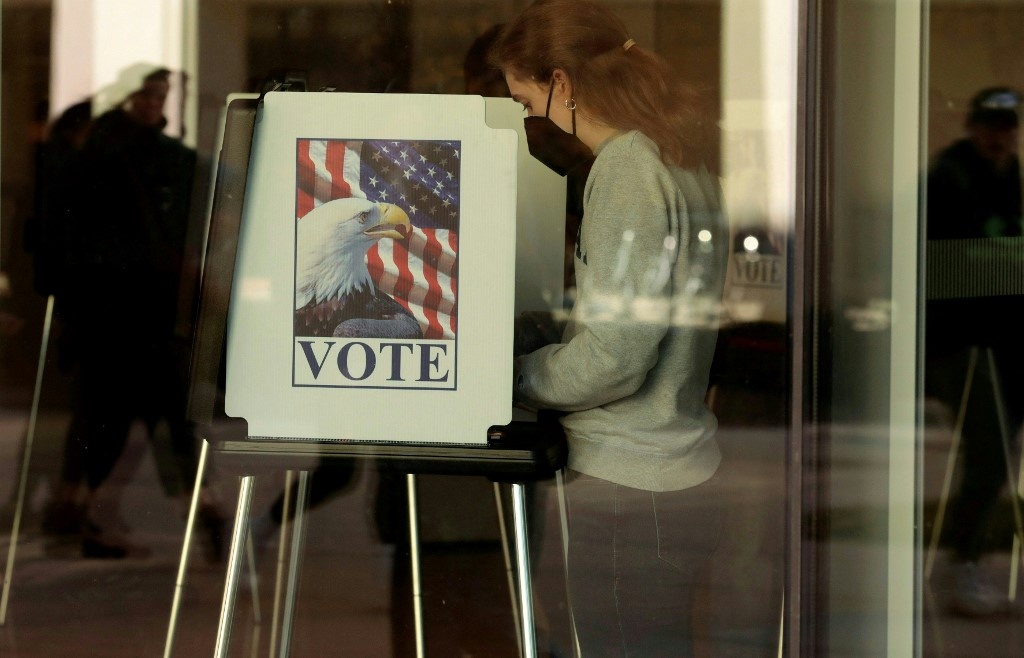
U.S. Midterm Elections: What They Mean For Ukraine – Kyiv Post
Control of the U.S. Congress is at stake as Americans take to the polls in the 2022 midterm elections on Tuesday, Nov. 8, a vote with global implications not least in Ukraine.
With the Democrats in charge of both the U.S. House and Senate, the Biden Administration has provided a massive and steady flow of weapons and aid to the country as it fights back against Russia’s unprovoked invasion, now into its ninth month.
But Republicans look set to make gains in both chambers on Tuesday, raising the prospect of a change in stance towards the war.
Here’s what the midterm elections could mean for Ukraine.
Who’s going to win?
According to respected pollsters FiveThirtyEight, the Republicans are clear favourites to take control of the House in Tuesday’s vote, saying there is currently an 84-in-100 chance in favour of this result. They are also slightly favoured to take control of the Senate with a 57-in-100 chance in favour.
Why is this a concern for Ukraine?
A number of high-profile Republicans have in recent weeks expressed their displeasure at vast amounts of U.S. aid going to Ukraine at a time when many Western countries, the U.S. included, are facing the prospect of economic hardships at home.
A few on the party’s fringes have even expressed their support for Russia and are openly hostile to the current Ukrainian government.
What’s actually at stake?
According to the U.S. Constitution, the House initiates all spending resolutions like those that have so far delivered billions of dollars in aid to Ukraine.
If Republicans take control of the House, then they will have to decide whether they continue, reduce or even stop this assistance to Ukraine.
At this stage it is not exactly clear what will happen, but the Republican Party is split down clear ideological lines over the correct way forward.
What are Republicans saying?
In terms of the Ukraine debate, Republicans can be split into three camps – the traditional hawkish side of the party that opposes Putin and wants to see aid continue, a more moderate group that opposes Putin but says they have to balance aid to Ukraine against domestic fiscal responsibilities, and a third group of extremely vocal fanatics and conspiracy theorists who refuse to believe Putin is the bad guy at all.
The first of these groups has been typified in comments from Senate Minority Leader Mitch McConnell, who recently said not only that aid to Ukraine should continue but that it could even be increased if needed, urging President Biden to “to do more to supply the tools Ukraine needs to thwart Russian aggression”.
The most important actor in the second group is House Minority Leader Kevin McCarthy who, by the end of Tuesday, looks set to be House Majority Leader.
Comments he made last month in which he said Ukraine would not get a “blank check” in a Republican majority were widely reported as signaling a triumphant Republican Party would severely curtail aid.
In a reassuring sign for Ukraine, his allies have since sought to clarify his comments, with one telling CNN: “McCarthy was not saying, ‘We wouldn’t spend money.’ McCarthy was saying, ‘We’re gonna be accountable to the taxpayer for every dollar we spend.’”
Which leaves us with the third group of Republicans, personified best in the form of far-right Republican Marjorie Taylor Greene who has yet to come across a baseless conspiracy theory that she couldn’t get behind and who said earlier this month that “under Republicans, not another penny will go to Ukraine”.
Cut from the same conspiratorial cloth is Wendy Rogers, an Arizona state senator who just days after the Russian reinvasion of Ukraine in February, tweeted: “Zelensky is a globalist puppet for Soros and the Clintons.”
Unfortunately, comments such as this inevitably receive vast amounts of media coverage and gain far more traction and gravitas in public perception than they deserve.
So how do these views translate into actual numbers?
Despite widespread coverage of people like Greene and Rogers, a majority of both Republican officials and voters still support Ukraine but crucially, this number has been in decline as the war has dragged on.
Back in March, a poll by The Wall Street Journal found that only 6 percent of Republicans thought the U.S. was doing too much to support Ukraine but that figure now stands at 48 percent.
What can Biden do?
Ultimately, Biden is still the president and he his top aides have said they will support Ukraine for “as long as it takes”, meaning a complete cutoff of aid is highly unlikely. But Democrats could be forced to water down or reduce aid packages in a bid to get them passed by the House. If Republicans also take the Senate then things would be even more difficult and almost entirely down to the whims of Republicans.
Already last week, a provision in a bill that would have allowed the Justice Department to send Ukraine millions of dollars converted from seized Russian assets was opposed by Republican lawmakers.
What does Ukraine have to say about this?
It’s undeniable that there is a lot at stake for Ukraine, namely its very existence in the face of Russian aggression which has been facilitated by U.S. aid and support. As such, any talk of possible changes to this would be highly consequential, but in Kyiv officials are filtering out the noise created by the more fringe elements of the Republican Party and focusing on what they know for sure.
Ukrainian lawmaker Oleksandr Merezhko of the ruling Servant of the People faction, who also heads the Ukrainian Parliament’s Committee on Foreign Policy and Interparliamentary Cooperation, told Kyiv Post he has “no anxieties” about Tuesday’s vote as the majority of Republicans still support Ukraine.
He added: “We expect there might be changes but I don’t expect any negative changes in terms of support for Ukraine.
“We have many friends in the U.S. and the most influential Republicans are supporting Ukraine. It doesn’t matter who is in power because we’ve already established a consistent and stable policy towards Ukraine, so I don’t have any anxieties.”
What does Russia have to say about this?
Unsurprisingly, state-sanctioned narratives expressed on state TV are fully supportive of the more extreme side of the Republican party, with one commentator saying Americans should be asking when they will get back the money the U.S. has spent “on a war they don’t need”.
Even more worryingly, the influential Russian businessman, Yevgeny Prigozhin, who’s also a close ally of Putin, this week admitted to interfering in U.S. elections, both historical and presently.
In a request to comment on a Bloomberg report saying Russia was interfering in the U.S. midterm elections, Prigozhin, who has been accused of running a “troll factory” to influence the outcome of votes in several Western countries, said: “Gentlemen, we interfered, we are interfering and we will interfere.
“Carefully, precisely, surgically and the way we do it, the way we can.”
So what’s the verdict?
While no one can predict the future with 100 percent certainty, on balance it seems that a Republican victory in Tuesday’s midterm elections is unlikely to result in an immediate drastic cut in support to Ukraine, though aid packages may pass through the House more slowly and could be slightly watered down. The prospect of a total cut in aid is almost certainly off the table.
What should be of more concern for Ukraine is the vote that will happen in two years time. The prospect of Russia’s invasion of Ukraine lasting until and beyond the 2024 presidential election is not one any right-thinking person wants to consider but it’s not out of the realm of possibilities and public opinion, particularly in the U.S., and will inform nations’ decisions about whether or not to continue their support.
Even in a party with a House and Senate majority, Republicans like Marjorie Taylor Greene will not be in charge of making decisions about Ukraine in the coming weeks and months. The danger lies in the wider influence this vocal minority has on an American public increasingly exposed to baseless conspiracy theories devoid of any sort of factual reality.
And one person who is listening is Donald Trump, who recognises the rousing and unifying power of conspiracies. And if he somehow manages to make his way back into the White House then all bets for Ukraine are off.


Average Rating